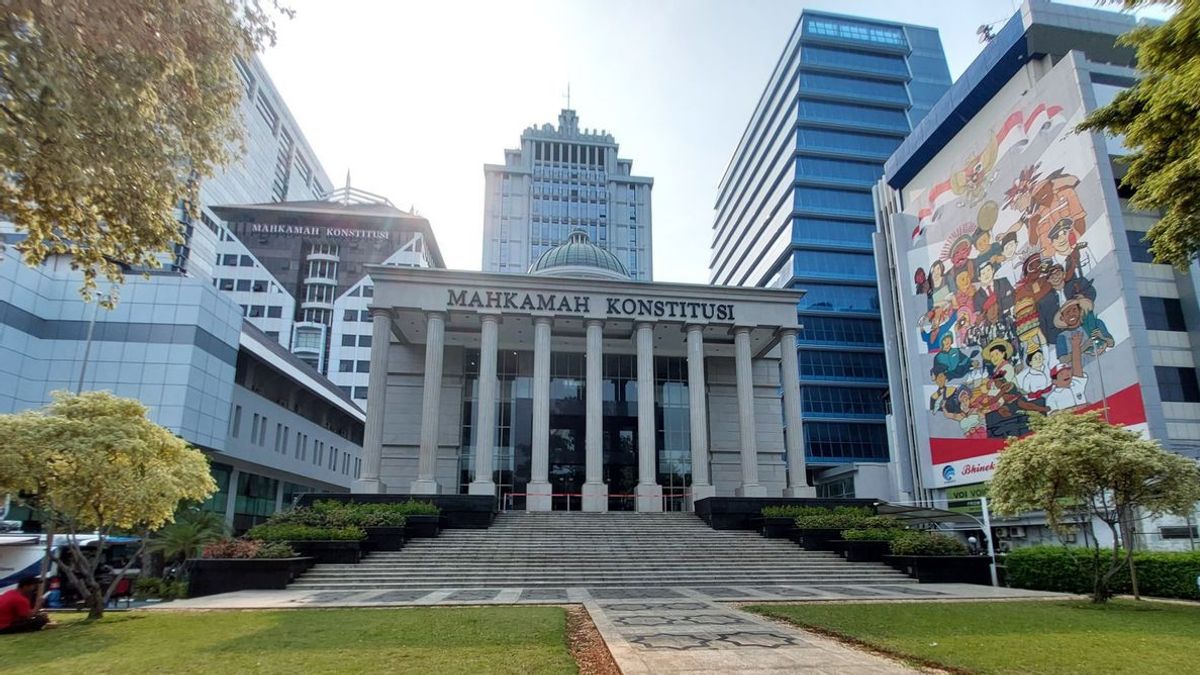JAKARTA - The Constitutional Court (MK) considers honorary teachers to be prioritized as Government Employees with Work Agreements (PPPK).
"The Court considers that the perspective that must be built is to prioritize honorary teachers to become PPPK," said constitutional judge Daniel Yusmic Pancastaki Foekh when reading the considerations of the Constitutional Court's Decision Number 119/PUU-XXII/2024 reported by ANTARA, Wednesday, October 16.
However, he continued, honorary teachers to become PPPK must meet the requirements in accordance with statutory provisions.
The lawsuit was filed by an honorary teacher at a private school in Jakarta regarding Article 66 of Law Number 20 of 2023 concerning State Civil Apparatus (US ASN).
Daniel requested that the norm, which essentially eliminates honorary labor as of January 2025, be postponed to the implementation of non-ASN personnel, so that all honorary workers who were already working before the law were promulgated to become ASN, both PPPK and PNS.
The Court claimed to understand the impact of Article 66 of the ASN Law, such as honorary teachers who lost their jobs and the opportunity to develop a career as teachers.
The Constitutional Court hopes that the arrangement of honorary teachers applies the principles of openness so that the recruitment process runs fairly, transparently, participatively, and accountably.
"Moreover, if it is related to the concrete case experienced by the Petitioner, the policy of cleaning honorary teachers, will certainly cause a shortage of teachers in the school unit to interfere with the teaching and learning process, which in turn students in schools become victims of this policy," said Daniel.
The Constitutional Court emphasized that the work units of honorary teachers must be proactive so that honorary teachers are registered in the database (BKN database, DAPODIK, and NUPTK), and must propose needs, formation, and qualifications.
"So, there is an opportunity for the honorary teacher to increase his status to become an ASN or PPPK," said Daniel.
The reason is, in the Decree of the Minister of PAN-RB Number 348 of 2024 regarding the recruitment of teacher PPPK in regional agencies, there are a number of conditions that must be met.
First, he must be registered in the database of non-ASN personnel at BKN who actively teach government agencies.
Second, non-ASN teachers in public schools must be registered in the Basic Educational Data (Dapodik) of the Ministry of Education, Culture, Research, and Technology and actively teaching for at least 2 years or 4 semesters continuously in teaching agencies when registering.
Third, he must have education qualifications with the lowest level of undergraduate or diploma four (D-4) and/or educator certificates.
Even though the honorary teacher has taught years in school units, said Daniel, honorary teachers must first be registered at each level or across institutions according to their respective authorities.
"Meanwhile, regarding honorary employees who are not included in the database, but in fact, they have met the requirements for serving time, they must be protected by their rights and continue to be processed to become PPPK according to the grace period," he said.
However, the Constitutional Court rejected the petitum of the petitioner filed.
"Reject the applicant's application in its entirety," said Chief Justice of the Constitutional Court Suhartoyo.
SEE ALSO:
In considering its decision, the panel of judges confirmed that the Court adhered to the two previous decisions.
Departing from the Constitutional Court Decision Number 9/PUU-XIII/2015 in 2016, the Constitutional Court stated that ASN recruitment was based on professionalism.
In addition, ASN recruitment is intended for applicants in general and not just honorary workers.
The Constitutional Court also considers, that way, the honorary workforce will still have the opportunity to participate in ASN recruitment as long as it meets the qualifications and principles of professionalism.
Then, departing from the consideration of the Constitutional Court's decision Number 9/PUU-XVIII/2020, the Court has also advised the government to consider every policy taken to be able to protect the rights of honorary workers.
"The Petitioner does not need to worry that his constitutional rights will be violated by the enactment of Law 20/2023," said constitutional judge Guntur Hamzah reading out the considerations of the Constitutional Court's decision this time.
Due to the fact, he continued, in Law 20/2023 related to the rights of honorary employees, it still exists and accommodates the rights of honorary workers.
"Thus, it is clear that related to the constitutional losses questioned by the applicant, it has been answered by the establishment of the Supreme Court in question," he said.
The English, Chinese, Japanese, Arabic, and French versions are automatically generated by the AI. So there may still be inaccuracies in translating, please always see Indonesian as our main language. (system supported by DigitalSiber.id)












